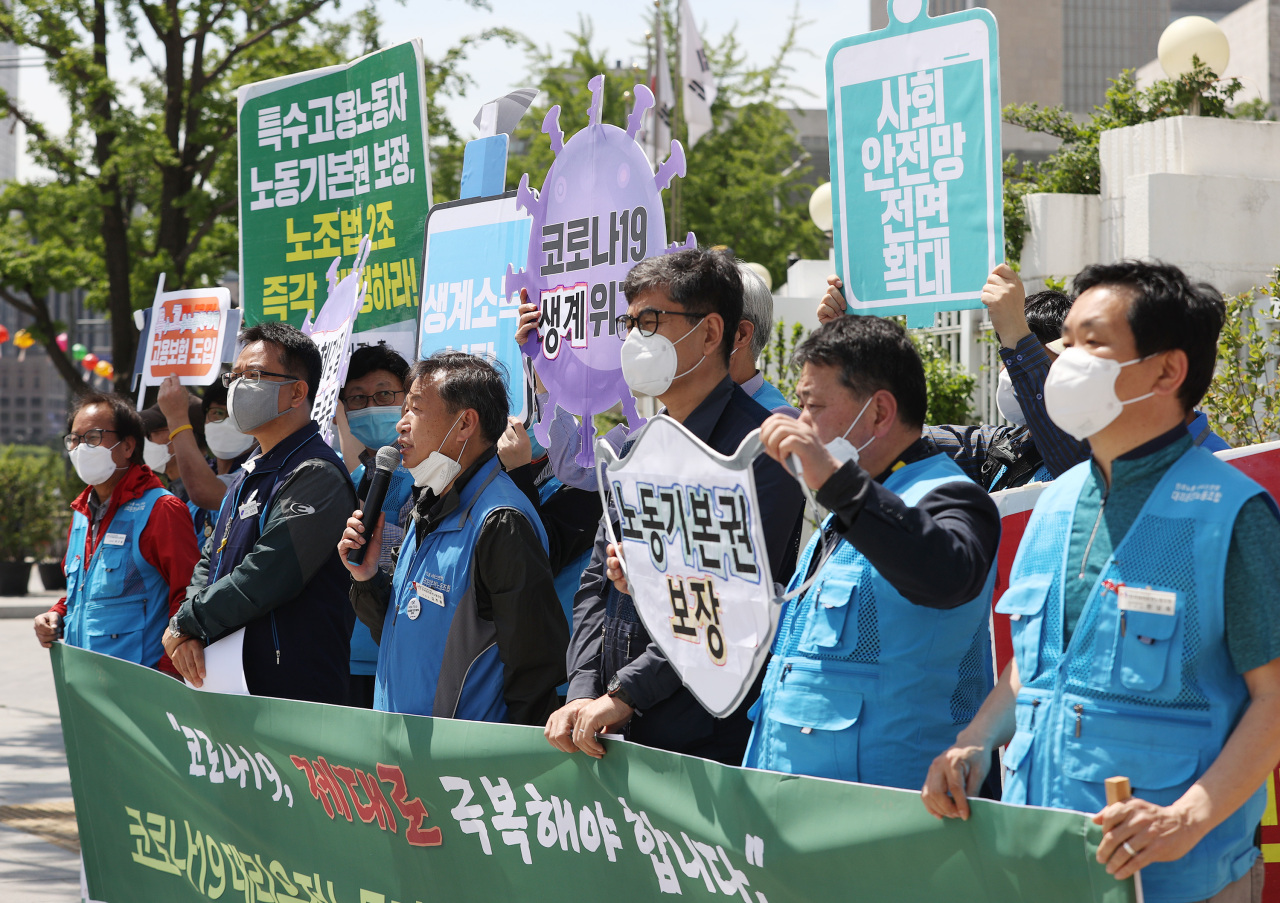[News Focus] Korea mulls expansion of employment insurance to all workers
By Kim So-hyunPublished : May 8, 2020 - 11:00

Following the universal payout of COVID-19 disaster relief money, the ruling party and government began talks about expanding employment insurance coverage to all workers, including the self-employed.
The topic was raised by the presidential office a week ago.
“It is a post-coronavirus task to insure everyone against unemployment, like the national health insurance,” Kang Gi-jung, senior presidential secretary for political affairs, said at a seminar on May 1 in response to a question on the lack of a social safety net for those without employment insurance.
Only 49.4 percent of the employed population in Korea had employment insurance coverage according to a government survey in August last year.
Workers in “special forms of employment” such as day laborers, self-employed people, courier service workers, golf caddies and door-to-door salespeople are not covered by employment insurance.
Labor Minister Lee Jae-Kap said the insurance scheme should be gradually expanded to all workers.
“It is a path we must take, but it’s not something that can be done at once. We can only introduce it in phases through sufficient discussions,” the minister said in a town hall meeting hosted by the presidential committee on jobs on Wednesday.
Lee said the government could start with having workers in special forms of employment and artists join the employment insurance program, as well as providing job seekers in the low-income bracket with 500,000 won ($408) per month for up to six months.
Bills for both have been submitted to the National Assembly, but have not yet passed.
In order to introduce a universal employment insurance system, matters such as how to collect the premiums, how to set premium rates and how much unemployment benefits must be settled all at once, according to Bae Kiu-sik, president of the state-funded Korea Labor Institute.
Employees can pay the premiums with their employers, but workers in special forms of employment or platform workers cannot, making the self-employed reluctant to join the employment insurance program, he said.
While most experts agree on having more workers insured against unemployment, the major problem is how to fund the increased benefits.
The Korea Workers’ Compensation & Welfare Service collected 11.4 trillion won in employment insurance premiums last year. Trillions more will be needed to cover all workers.
Questions like, “Should the government pay the premium for small business owners if they can’t afford to pay themselves?” need to be answered.
As the Moon Jae-in administration sought to extend the scope of workers covered by the employment insurance and increased unemployment allowances, however, the employment insurance fund posted a deficit of nearly 2.1 trillion won last year.
On Wednesday, the Democratic Party of Korea’s committee on tackling COVID-19 and government officials discussed expanding the social safety net to overcome the economic crisis caused by the pandemic.
“Paying attention to a looming employment crisis, we agreed that swift legislation to support job seekers was necessary, and that the issue of workers without employment insurance should be resolved quickly,” the Democratic Party committee spokesman Jin Seong-joon said in a press briefing.
Regarding universal employment insurance, there are many policy tasks to be settled beforehand, such as whom it should cover, how much premium should individuals pay and how to revamp the premium collection system, he said.
Park Kwang-on, a member of the Democratic Party’s supreme council, said in a meeting Monday that universal employment insurance was necessary to overcome the economic fallout of the contagion, and that the newly elected parliament should be able to pass it.
By Kim So-hyun (sophie@heraldcorp.com)







![[Hello India] Hyundai Motor vows to boost 'clean mobility' in India](http://res.heraldm.com/phpwas/restmb_idxmake.php?idx=644&simg=/content/image/2024/04/25/20240425050672_0.jpg&u=)











